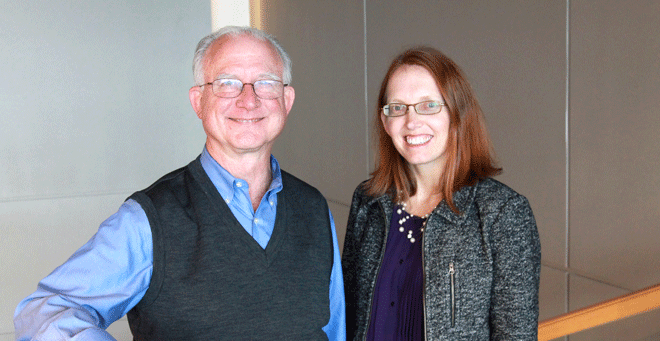 |
|
|
C. Robert Matthews, PhD, and Cynthia Fuhrmann, PhD, are leading the workforce and training work groups at the ASBMB Summit on Sustaining the Biomedical Research Enterprise taking place Feb. 4 and 5. |
UMass Medical School scientists C. Robert Matthews, PhD, and Cynthia Fuhrmann, PhD, are among 30 academic, industry and government experts convened by the American Society for Biochemistry and Molecular Biology to determine the actions necessary to solve problems confronting the American biomedical research enterprise. Attendees have been working for two months to develop actions for reform and will present their ideas for group discussion at the ASBMB Summit on a Sustainable Biomedical Research Enterprise taking place Feb. 4 and 5 in Washington, DC.
“The science community has put out numerous recommendations for how to address extremely tight research funding; increasing numbers of PhD students and postdoctoral associates being trained; and a need to better prepare these trainees for a wide array of careers,” said Dr. Fuhrmann, assistant professor of biochemistry & molecular pharmacology and assistant dean for career and professional development for the Graduate School of Biomedical Sciences. “This summit is structured to harness this energy and push forward from recommendations to action.”
The experts have been charged with determining concrete, tangible actions the scientific community can take to rebalance the size of the research workforce with available funding, while continuing to train the next generation of scientists and produce important discoveries. They will evaluate ideas about how best to sustain the enterprise, and identify obstacles to be overcome. Immediately following the summit, the ASBMB will announce an advocacy strategy designed to implement those ideas.
Dr. Matthews, chair and professor of biochemistry & molecular pharmacology, is a member of the ASBMB Public Affairs Advisory Committee and was a co-author of the society’s 2012 white paper “Toward a Sustainable Biomedical Research Enterprise,” which expanded awareness of the issues and challenges the summit will address.
More recently, in 2015, Matthews and other ASBMB leaders co-authored a meta-analysis of recommendations from previous reports including the white paper. Published in PNAS, the study identified the consensus recommendations for sustaining the American biomedical research enterprise that the summit will focus on advancing.
“Questions we want to answer are what should the workforce of the future look like; what level of funding would make it sustainable; and how do we train our students and postdocs in this climate?” said Matthews. “And who should be the workforce in a research lab? Are there personnel we don’t have now, like staff scientists, that different compensation structures could support?”
Matthews is leading the summit’s workforce working group. Fuhrmann is co-leading the training working group with Bruce Alberts, PhD, the Chancellor’s Leadership Chair in Biochemistry and Biophysics for Science and Education at the University of California, San Francisco and former president of the National Academy of Sciences and editor of the journal Science. Fuhrmann collaborated with Dr. Alberts at UCSF, where she developed her expertise in biomedical sciences career development before joining the GSBS in 2012.
UMass Medical School is a recognized leader in exploring and implementing ways to expand career preparation and opportunities for biomedical sciences graduate students and postdoctoral associates. The GSBS was awarded an inaugural Broadening Experience in Scientific Training (BEST) grant from the National Institutes of Health and established the Center for Biomedical Career Development.
“The goal of the summit training subgroup is to encourage other universities to adopt the kind of culture we are lucky to have at UMMS: a culture valuing the diversity of career paths scientists go into, and how that impacts the training we need to do,” said Fuhrmann. “All schools, UMMS included, want to develop independent researchers and that won’t change. What we, as a broader scientific community, need to consider more thoughtfully is how to develop cutting edge scientists who also see themselves as adaptable across different career paths, are able to pursue those paths and can strengthen the scientific enterprise as a result.”
Related links on UMassMedNow:
UMMS eClub developing scientists’ entrepreneurial know-how and contacts
New initiative to build culture of drug development entrepreneurship
New executive vice chancellor hired to lead business development initiatives
NIH grant integrates career planning with scientific training
Tilghman to speak about research and career trends for biomedical scientists
UMMS tech tool helps scientists navigate career path
Newsmaker: Career planning tool wins AAMC award